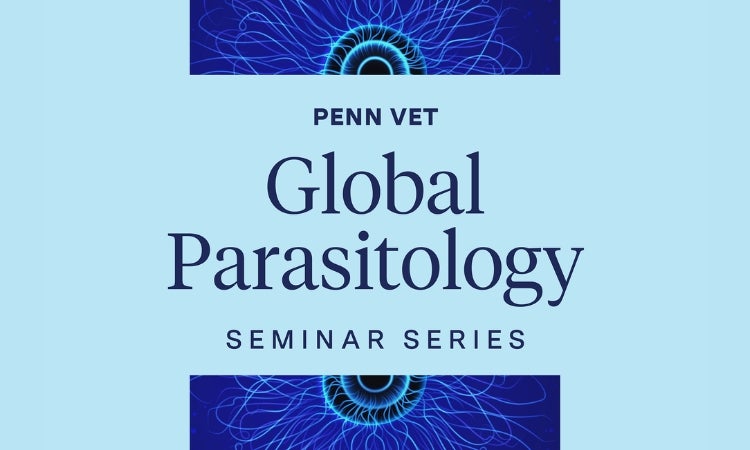Hybrid Event
Events
Global Parasitology Seminar Series
IIZD hosts the Global Parasitology Seminar Series, which brings together speakers and audiences from around the world to share the latest research in parasitology, immunology, and molecular biology.
Seminars are open to all and are held in a hybrid format on select Mondays at 12:00 p.m. ET.
Email Nicole Hurd to be added to the announcement list.

Parasitology Research in Progress (P-RIP) Series
Parasitology Research in Progress (P-RIP) is a parasite biology forum where students, postdocs, and staff present their research and receive feedback in an informal and comfortable space. P-RIP provides an opportunity for trainees to present ongoing work in a relaxed atmosphere and to strengthen connections in the parasitology community across campus and the greater Philadelphia area.
The P-RIP series is held monthly on Wednesdays at 4 p.m. in Hill 301 and features two presenters.
P-RIP Series 2025-2026 Dates
- October 15, 2025
- November 12, 2025
- December 10, 2025
- January 14, 2026
- February 11, 2026
- March 11, 2026
- April 15, 2026
- May 13, 2026
Symposia
IIZD hosts an annual symposium that brings together scientists, clinicians, veterinarians, and public health experts to exchange ideas on the emergence, spread, and control of infectious and zoonotic diseases.
The 2025 IIZD Symposium
Robert R. Marshak Public Lecture
Keynote speaker Peter Hotez, MD, PhD, of Baylor College of Medicine, delivered the Marshak Public Lecture on March 19th. His talk, Vaccines and Immunizations in a Time of Global Boiling and Anti-Science, set the stage for the symposium.
The lecture was moderated by Michael Mann, PhD, Penn’s Vice Provost for Climate Science, Policy, and Action. Mann and Hotez are co-authors of Science Under Siege, released September 2025.
The public lecture was co-hosted by Penn’s Annenberg Public Policy Center.

Peter Jay Hotez, MD, PhD
Scientific Program
Distinguished experts from across the country showcased their latest breakthroughs in zoonotic disease research during the scientific program on March 20th.
Invited speakers included:
- Christine Johnson, VMD, MPVM, PhD, UC Davis
On the frontlines: surveillance for emerging infectious diseases - Marc Johnson, PhD, University of Missouri
Flush with data: using wastewater surveillance to monitor expected and unexpected pathogens - Erin Mordecai, PhD, Stanford University
More than warming: climate change is transforming the kandscape of vector-borne diseases - Salvador Almagro Moreno, PhD, St. Jude Children’s Research Hospital
Emergence and evolution of bacterial pathogens: deciphering a complex phenomenon - Bill Petri, MD, PhD, University of Virginia
Immunologic mechanisms of FMT for recurrent C. difficile infection - Jürgen Richt, DVM, PhD, Kansas State University
Experimental infection of livestock with bovine H5N1 - Mark Wilber, PhD, University of Tennessee
Challenges and opportunities when identifying pathogen reservoirs in wildlife communities
Also featured were talks by the 2024 Martin and Pamela Winter Infectious Disease Fellows:
- Raegan Petch, Bates Lab
Mutations that positively affect bandavirus glycoprotein function on VSV - Daana Roach, Hamilton Lab
LCN2 Contributes to an altered secretory environment in the intestinal epithelium in Crohn’s disease - Helen Stillwater, Weiss Lab
Clade C MERS coronaviruses circulating in northern Africa differentially activate the innate immune response
